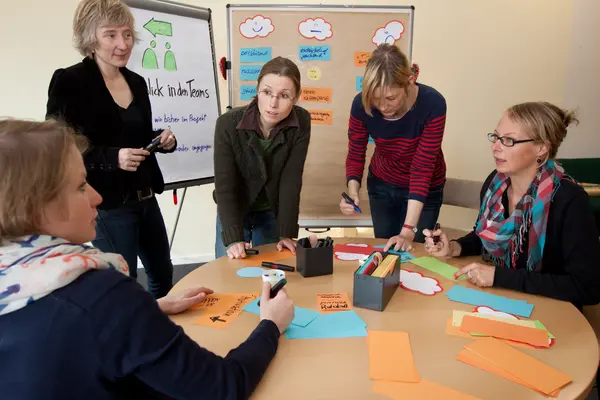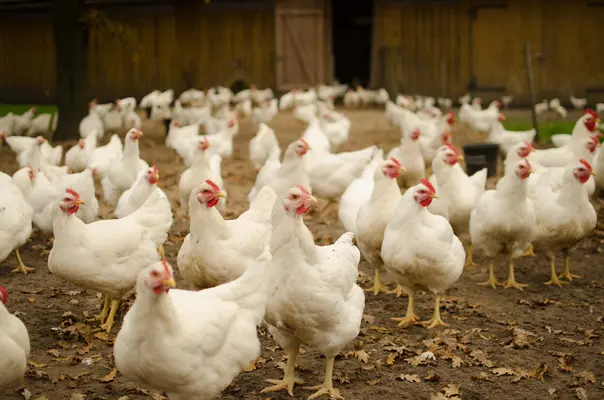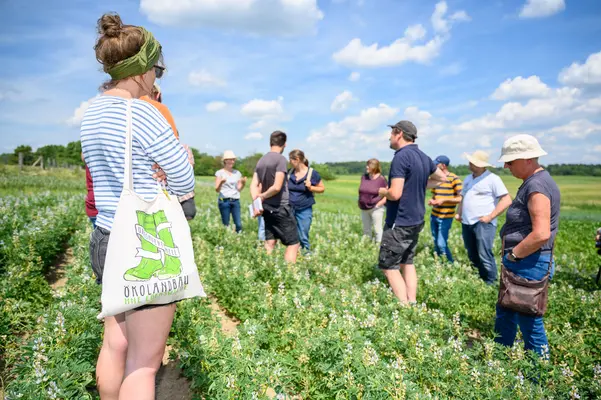Individual study contents
The degree programme consists of 6 semesters. You can collect 30 ECTS per semester, 180 ECTS in the entire Bachelor's degree programme. In the first two semesters we only teach the basics - in the lecture hall and outside. After this technical preparation and an orientation workshop, you as a student begin your practical semester (practical phase). In the fifth semester, you choose one of the three specialisations offered: Plant Production, Animal Production or Sustainable Agriculture and Food Management.
Modules per semester
In the first semester, you will learn the theoretical basics of biology, economics, location factors and scientific work. In addition, you will work on the principles of sustainability in an interdisciplinary module.
You will acquire basic knowledge of the biology of crops and farm animals. Ethological, anatomical and physiological basic knowledge of farm animals and their importance for maintaining health are part of this module.
The contents of the module include the history of origins, development phases and current challenges of organic agriculture. We want you to develop a systemic understanding of sustainability.
In addition to basic knowledge of economics, in this module we classify agricultural and food economics as part of the national economy. Agricultural business management enables you to solve individual farm decision-making processes and to apply planning instruments.
Basic knowledge of the site factors soil, hydrology, geology, geomorphology and climate will enable you to evaluate sites for soil fertility. You will learn about the requirements of plant nutrition in organic farming and the resulting interactions.
We teach you central techniques of scientific work and their interdisciplinary application as well as the organisation of work processes for the joint creation of scientific achievements. This also includes the basics of statistics.
In the second semester you will acquire more specific basics on marketing, arable and crop farming and animal production. You will combine practical experience on a partner farm with the basics you have learned and gain an intensive insight into real working and living environments in the organic agricultural and food industry in Berlin/Brandenburg.
This module is about the development and implementation of strategic and operational marketing decisions of actors in the agri-food sector.
You learn the structure, function and application criteria of machines and equipment as well as the evaluation from a technical point of view.
This includes the forage-related assessment of grassland stands based on species composition and the derivation of management measures.
Expertise in animal breeding and husbandry, the planning and evaluation of husbandry systems for livestock are included in this module. You will also learn about origins and breeding methods for organic farming.
With a problem- and action-oriented learning approach, you will gain access to a project of the practice partner. For finding solutions, the development of professional competence is of equal importance to social and personal competence.
You acquire your knowledge independently, actively and on your own responsibility. At the same time, you will gain your first practical experience in the company.
Based on the experimental design, which was usually developed in the compulsory elective module Crop Production Systems 1, you will set up a field trial and record field data. The data evaluation is carried out independently. Your trial results are presented at the HNEE field day or at a specialist event.
The third semester serves to deepen your knowledge of the basics of animal and plant production. In addition, you will get to know the contents of the fields of action agricultural and food policy, accounting and financial management.
You will be introduced to the evaluation and planning of cattle, pig and chicken feeding. The focus is on the livestock species cattle.
The evaluation of crop production systems (arable and grassland systems), the classification of crop types with their requirements as well as yield and quality parameters are the content of the module. You independently develop solutions for problems in the various crop-specific cultivation methods.
The topic of the module is the evaluation of the effects of current developments in agricultural, food, nutrition and environmental policy from an individual farm, regional, sectoral and macroeconomic perspective.
You will learn about instruments of internal and external accounting, agricultural accounting and balance sheet analysis. Financial mathematical basics and the application of financial planning instruments will become your tools of the trade.
With the professional preparation from the basic studies and an orientation workshop, you will begin your practical study semester in the fourth semester (practical phase).
In the practical phase, you will take a look at how organic farming and the food industry work. The focus is on the practical application and deepening of knowledge and skills that you have previously acquired in the course of your studies. Above all, you will carry out and analyse practical work according to a jointly determined training framework plan under qualified guidance.
This includes insights into circular economy, processes in plant cultivation and animal husbandry, in the processing and marketing of products and in quality assurance in organic farming.
In the fifth semester, you choose one of the three specialisations offered: Plant Production, Animal Production or Sustainable Agriculture and Food Management.
In the specialisation Animal Production, you acquire in-depth competences on the husbandry and health of the main farm animal species cattle, pigs and chickens, but also other animal species such as the small ruminants goats and sheep as well as poultry such as geese. Current challenges for animal husbandry such as climate, environmental and animal welfare improvement and current social debates about the role of animal husbandry in society are also covered in the specialisation.
In the crop production specialisation, you will acquire in-depth skills for investigating current crop production issues from practice (e.g. planning, setting up and evaluating field trials for testing new crops, varieties, fertilisation methods). Students expand their specialist knowledge of organic vegetable production and special crops. The integration of crop production methods into the agro-ecological context plays an essential role. Current challenges such as the adaptation of cultivation systems to the effects of climate change or the promotion of biodiversity through the application of special conservation measures are also addressed.
In the specialisation Sustainable Agriculture and Food Industry, you will acquire in-depth competences for the analysis of business models in the agriculture and food industry, taking into account sustainability-specific guiding questions, on the environments and framework conditions of typical business models and value chains in the agriculture and food industry. Students expand their competences for the economic evaluation of selected agricultural production processes and branches of animal and plant production, as well as quality assurance in food value chains. Current sustainability challenges in the food system and approaches to solving them form the basis of this specialisation.
In preparation for your scientific final project, you will learn the basic working steps of planning, conducting and evaluating (field) experiments and empirical social research. These are applied exemplarily to their own and current questions.
You will collect parameters on the agroforestry trial area, plan and carry out a trial set-up and evaluate it. In doing so, you will learn about agro-ecological interrelationships, political framework conditions and potentials of different agroforestry systems.
Students undertake the conceptual development, preparation and practical implementation of a field trial on currently relevant issues of organic arable, crop and field forage production.
We will show you possibilities for the use of working horses in arable and vegetable farming, grassland, forestry and landscape management. You will receive basic information on the training of horse and owner, on husbandry and feeding and the classification of the use of working horses under aspects of sustainability.
In this module, acquire an understanding of digitalisation as a permanent task of business management. This includes operational planning, reports and evaluations as well as necessary data. In an exemplary application of IT-supported data provision, you will immerse yourself in digitalised business management and process design.
In this intensive seminar we will work with you on central questions and topics of business start-ups in the agricultural and food sector and deal with the planning of steps in start-up and succession processes.
Selected agricultural or horticultural operational issues for the redesign, further development or adaptation of agricultural technology processes are the focus of this module. This includes detailed planning and evaluation of outdoor and indoor technology procedures and the use of machines, plants and equipment.
An assessment and improvement of the influence of agricultural use on natural soil functions as well as on the environment is the content of the module.
This is about the design of future sustainable food systems based on the consideration, analysis and evaluation of sustainable food from socio-cultural, economic and technical perspectives.
You will deal with the requirements for the registration and approval of a food business. You will learn about the duties of a person responsible for food processing. Facilities and processes for the production of food of plant and animal origin and the design of quality assurance measures are included.
In this module, we discuss the assessment of ecosystem services (ESL) such as agricultural production, climate protection or the conservation of genetic resources with the help of relevant tools in practical operations, the analysis of conflicting goals and development options for optimising ESL.
Here you will deepen the knowledge you have acquired in the basic modules by applying it on sample farms. We also work with you on breeding, husbandry and feeding, the analysis and planning of farm branches.
The module lets you experience potentials of agriculture for social services in the fields of health, inclusion, employment, education and therapy. You will deal with planning and implementation in cooperation with other social services in agriculture.
Various less frequently kept animal species come into question as a possible alternative source of income in agriculture and you will learn to assess the corresponding farm branches comparatively. You will have basic knowledge of breeding, husbandry and feeding for the individual animal species. You will apply this knowledge in exercises.
Production diseases of cattle, pigs and chickens with corresponding disease symptoms and causes as well as the derivation of preventive measures are the focus of this module.
You will use instruments of business management, transfer approaches of management, organisation and coordination to operational situations. In the module you will also learn how to assess inter-company cooperation and value creation networks in the organic agricultural and food sector.
You will deepen your chosen specialisation. For this purpose, you choose three elective modules assigned to the specialisation during the course of study. The thesis in the sixth semester is thematically adapted to the specialisation.
You will analyse business models in the agricultural and food sector and consider the effects of changing framework conditions on them. In the module, you develop application-oriented scenarios for further development.
We give an overview of the most important vegetable species and their location requirements. Characteristics of field vegetable cultivation, greenhouse cultivation and young plant cultivation and a comparison of different cultivation methods is part of the content. You will derive suitable measures for different types of crops and learn principles of proper harvesting and storage for important vegetable species.
You will learn about business management evaluations and the analysis of selected agricultural branches and production processes of crop and livestock production. This also includes the application of cost-performance accounting instruments (e.g. contribution margin accounting, farm branch accounting).
Different forms of use of horse husbandry in agriculture and basic knowledge in the areas of horse breeding, horse husbandry and horse feeding are taught in this module.
Through a project-oriented and research-based learning approach, students are able to independently analyse typical business processes and marketing developments. They are also able to carry out business management planning from practice and develop marketing concepts. This takes place in groups in cooperation with company managers and specialist lecturers.
You can deepen and apply the knowledge acquired in the basic modules using example farms in the areas of breeding, husbandry and feeding. This also includes the analysis and planning of farm branches.
In this module we work on the recording of grassland stands and their assessment according to agricultural and nature conservation criteria with reflection of development goals for the stands. Subsequently, we derive corresponding management recommendations.
We develop possibilities for the use of regenerative forms of energy on farms. In doing so, we include current regenerative energy sources with their conversion paths for energetic and material use and look at possibilities for the material and energetic use of renewable raw materials.






